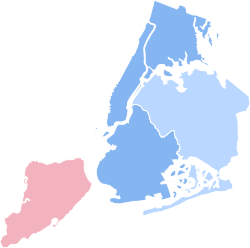Background
Incumbent Mayor Robert F. Wagner Jr. had strong ties to the Tammany Hall organization, which had been headed by Carmine DeSapio since 1949. By 1960, however, Wagner realized that Tammany was a potential liability. [4]
In January 1961, tensions with DeSapio and Tammany Hall came to a head when Manhattan Borough president Hulan Jack was convicted of an attempt to solicit a bribe and automatically removed from his position. The vacant post was formally filled by a vote of Manhattan's six City Council members, but historically, the selection was de facto made by Tammany. Ahead of the vote, Wagner refused to speak with DeSapio, hoping to force DeSapio to move first and endorse a candidate and allow Wagner to signal his independence from Tammany. [5]
Wagner's choice was state Supreme Court Justice Edward R. Dudley while DeSapio selected Assemblyman Lloyd Dickens, an old opponent. [4] [6] Dudley was ultimately elected, but only after two Tammany councilmen were called into meetings with Louis Kaplan, the city Commissioner of Investigation, who pressured the councilmen for the Mayor's candidate. [5] Wagner also courted the support of the Liberal Party, the reformist Committee for Democratic Voters, and Herbert H. Lehman, the influential former governor and U.S. Senator. [7]
The final break occurred in early February, when Wagner publicly called for DeSapio to stand down as New York County Democratic Party chair. [5]
Campaign
In March, Wagner received the results of a poll from Louis Harris showing his support among different ethnic groups in the city. Polling showed Wagner to be personally popular African-Americans and Puerto Ricans, who made up about 20% of New York's total population. Both groups would be solid in support of Wagner both in the primary and against the Republicans in the general election. [8] Jews were also strong in their support of Wagner, with the poll indicating 70% would back Wagner against the Republicans, though only 56% would vote Democratic against a Jewish Republican nominee. African-Americans, Puerto Ricans, and Jews were deemed by Harris to be essential to Wagner's campaign. [9] Wagner's position was much more tenuous among Catholic Irish and Italian voters, who were generally against the Mayor and would be hard to capture. [8]
Wagner announced that he would run for reelection on June 22, 1961.
On June 30, two days after the Liberals voted to endorse Wagner, Tammany selected State Comptroller Arthur Levitt Sr., who was the only Democrat to win statewide in a heavily Republican year. The Jewish Levitt was selected in hopes of winning back Jewish voters from Wagner's side. Levitt was an unlikely choice, having stated in late summer that he expected Wagner to be the nominee, but a concerted push by Tamanny made Levitt give in and agree to challenge Wagner. [11]




